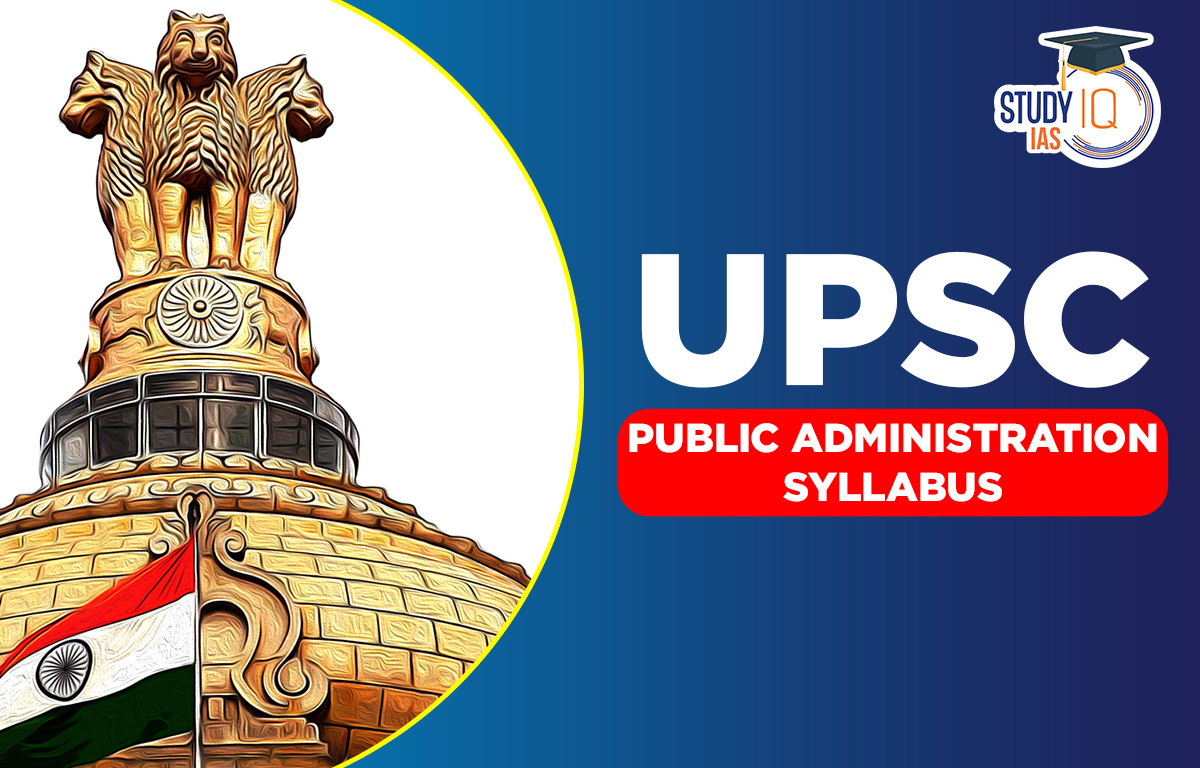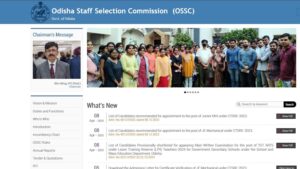Table of Contents
Public Administration Syllabus
UPSC Public administration optional syllabus is one of the optional syllabus with two papers in the UPSC Civil Services Mains Exam (Optional Paper I and Paper II). The UPSC Mains stage consists of nine papers. Public Administration is one of the 48 subjects available in the UPSC optional list. This article contains the IAS Public Administration syllabus for the UPSC exam. Each paper carries 250 marks.
UPSC Public Administration Optional Syllabus
The UPSC Public Administration Syllabus for both Paper I and Paper II is given below.
UPSC Public Administration Syllabus Paper I
Introduction
- Meaning, scope, and significance of Public Administration:
- The study of how governments manage their operations and deliver public services.
- Encompasses a wide range of activities, from policy formulation to implementation and evaluation.
- Essential for ensuring efficient, effective, and equitable governance.
- Wilson’s vision of Public Administration:
- A distinct field of study with its own principles and practices.
- Should be separate from politics and focus on efficiency and effectiveness.
- Evolution of the discipline:
- Classical theories (Weber, Taylor) emphasized hierarchy and control.
- New Public Administration movement (1960s) focused on social equity and citizen participation.
- New Public Management (1980s) emphasized market-based approaches and performance measurement.
- Current challenges:
- Globalization, technological change, and evolving citizen expectations.
Administrative Thought
- Key schools of thought:
- Scientific Management (Taylor)
- Classical Theory (Weber)
- Human Relations School (Mayo)
- Dynamic Administration (Follett)
- Functions of the Executive (Barnard)
- Participative Management (Likert, Argyris, McGregor)
Administrative Behavior
- Decision-making:
- Process and techniques
- Individual and group decision-making
- Communication:
- Effective communication within organizations
- Importance of feedback and listening
- Morale and motivation:
- Theories of motivation
- Strategies for boosting morale
- Leadership:
- Traditional and modern theories
- Effective leadership styles
Organizations
- Structure and forms:
- Ministries, departments, corporations, boards, commissions
- Public-private partnerships
- Headquarters and field relationships
- Regulatory authorities
Accountability and Control
- Mechanisms of accountability:
- Legislative, executive, and judicial control
- Citizen participation
- Role of media and civil society
- Tools for accountability:
- Citizen’s Charters
- Right to Information
- Social audit
Administrative Law
- Scope and significance
- Dicey on Administrative law
- Delegated legislation
- Administrative Tribunals
Comparative Public Administration
- Historical and sociological factors affecting administrative systems
- Administrative systems in different countries
- Ecology and administration
- Riggsian models
Development Dynamics
- Concept of development
- Changing profile of development administration
- Bureaucracy and development
- State versus market debate
- Impact of liberalization
- Women and development
Personnel Administration
- Importance of human resource development
- Recruitment, training, advancement
- Performance appraisal, promotion
- Employee relations
- Code of conduct
- Administrative ethics
Public Policy
- Models of policy-making
- Processes of conceptualization, planning, implementation, monitoring, and evaluation
- State theories and public policy formulation
Techniques of Administrative Improvement
- Organization and methods
- Work study and work management
- E-governance and Information technology
- Management tools
Financial Administration
- Monetary and fiscal policies
- Public borrowing and public debt
- Budgets: types and format
- Budgetary process
- Financial accountability: Accounts and audit
Public Administration Syllabus Paper II
- Evolution of Indian Administration :
- Kautilya Arthashastra;
- Mughal administration;
- Legacy of British rule in politics and administration Indianization of Public services, revenue administration, district Administration, local self Government..
- Philosophical and Constitutional framework of Government :
- Salient features and value premises;
- Constitutionalism;
- Political culture;
- Bureaucracy and democracy;
- Bureaucracy and development.
- Public Sector Undertakings :
- Public sector in modern India;
- Forms of Public Sector Undertakings;
- Problems of autonomy, accountability and control;
- Impact of liberalization and privatization.
- Union Government and Administration :
- Executive, Parliament, Judiciary-structure, functions, work processes;
- Recent trends;
- Intra-govenunental relations;
- Cabinet Secretariat;
- Prime Minister’s Office;
- Central Secretariat Ministries and Departments;
- Boards;
- Commissions;
- Attached offices;
- Field organizations.
- Plans and Priorities :
- Machinery of planning;
- Role, composition and functions of the Planning Commission and the National Development Council;
- Indicative’ planning Process of plan formulation at Union andState levels;
- Constitutional Amendments (1992) and decentralized planning for economic development and social justice.
- State Government and Administration :
- Union-State administrative, legislative and financial relations;
- Role of the Finance Commission; Governor: Chief Minister; Council of Ministers: Chief Secretary; State Secretariat;
- Directorates.
- District Administration since independence :
- Changing role of the Collector;
- Union
- State
- local relations;
- Imperatives of development management and law and order administration;
- District administration and democratic decentralization.
- Civil Services:
- Constitutional position;
- Structure, recruitment, training and capacity building;
- Good governance initiatives;
- Code of conduct and discipline;
- Staff associations;
- Political rights;
- Grievance redressal mechanism;
- Civil service neutrality;
- Civil service activism.
- Financial Management :
- Budget as a political instrument;
- Parliamentary control of public expenditure;
- Role of finance ministry in monetary and fiscal area;
- Accounting techniques;
- Audit Role of Controller General of Accounts and Comptroller and Auditor General of India.
- Administrative Reforms since Independence :
- Major concerns;
- Important Committees and Commissions;
- Reforms in financial management and human resource development;
- Problems of implementation.
- Rural Development :
- Institutions and agencies since Independence;
- Rural development programmes:
- foci and strategies;
- Decentralization and Panchayati Raj;
- 73rd Constitutional amendment.
- Urban Local Government :
- Municipal governance:
- main features, structures, finance and problem areas;
- 74th Constitutional Amendment;
- Global-local debate;
- New localism;
- Development dynamics, politics and administration with special reference to city management.
- Law and Order Administration:
- British legacy;
- National Police Commission;
- Investigative agencies;
- Role of Central and State Agencies including para military forces in maintenance of law and order and countering insurgency and terrorism;
- Criminalisation of politics and administration;
- Police-public relations;
- Reforms in Police.
- Significant issues in Indian Administration:
- Values in public service;
- Regulatory Commissions;
- National Human Rights Commission;
- Problems of administration in coalition regimes;
- Citizen administration interface;
- Corruption and administration;
- Disaster management
While Public Administration for UPSC has the potential to be a very high-scoring option, IAS aspirants should keep in mind that thorough preparation is required to score well in this paper. To crack the UPSC Public Administration papers, candidates should solve more questions from previous years’ UPSC question papers and read ARC reports. For a faster and easier preparation for the IAS exam, prepare for Public Administration as well as General Studies.


 Daily Quiz 18 April 2025
Daily Quiz 18 April 2025
 OSSC CGL Syllabus 2025 and Exam Pattern ...
OSSC CGL Syllabus 2025 and Exam Pattern ...
 AI and its Regulation in India, Limitati...
AI and its Regulation in India, Limitati...





















